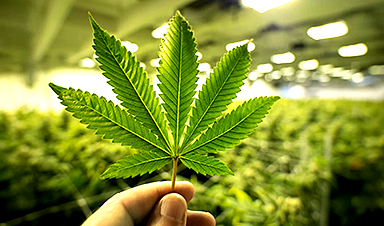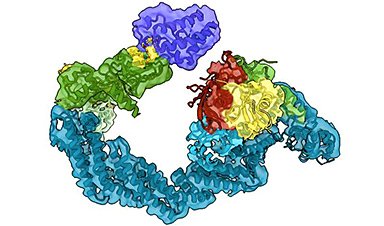As the deadly disease that came to be known as COVID-19 started spreading in late 2019, scientists rushed to answer a critical question: Who is most at risk?
They quickly recognized that a handful of characteristics—including age, smoking history, high body mass index (BMI) and the presence of other diseases such as diabetes—made people infected with the virus much more likely to become seriously ill and even die. But one suggested risk factor remains unconfirmed more than four years later: cannabis use. Evidence has emerged over time indicating both protective and harmful effects.
Now, a new study by researchers at Washington University School of Medicine in St. Louis points decisively to the latter: Cannabis is linked to an increased risk of serious illness for those with COVID-19.
The study, published June 21 in JAMA Network Open, analyzed the health records of 72,501 people seen for COVID-19 at health centers in a major Midwestern health-care system during the first two years of the pandemic. The researchers found that people who reported using any form of cannabis at least once in the year before developing COVID-19 were significantly more likely to need hospitalization and intensive care than were people with no such history. This elevated risk of severe illness was on par with that from smoking.
“There’s this sense among the public that cannabis is safe to use, that it’s not as bad for your health as smoking or drinking, that it may even be good for you,” said senior author Li-Shiun Chen, MD, DSc, a professor of psychiatry.
“I think that’s because there hasn’t been as much research on the health effects of cannabis as compared to tobacco or alcohol. What we found is that cannabis use is not harmless in the context of COVID-19. People who reported yes to current cannabis use, at any frequency, were more likely to require hospitalization and intensive care than those who did not use cannabis.”
Cannabis use was different than tobacco smoking in one key outcome measure: survival. While smokers were significantly more likely to die of COVID-19 than nonsmokers—a finding that fits with numerous other studies—the same was not true of cannabis users, the study showed.
“The independent effect of cannabis is similar to the independent effect of tobacco regarding the risk of hospitalization and intensive care,” Chen said. “For the risk of death, tobacco risk is clear but more evidence is needed for cannabis.”
The study analyzed deidentified electronic health records of people who were seen for COVID-19 at BJC HealthCare hospitals and clinics in Missouri and Illinois between Feb 1, 2020, and Jan 31, 2022. The records contained data on demographic characteristics such as sex, age and race; other medical conditions such as diabetes and heart disease; use of substances including tobacco, alcohol, cannabis and vaping; and outcomes of the illness—specifically, hospitalization, intensive-care unit (ICU) admittance and survival.
COVID-19 patients who reported that they had used cannabis in the previous year were 80% more likely to be hospitalized and 27% more likely to be admitted to the ICU than patients who had not used cannabis, after taking into account tobacco smoking, vaccination, other health conditions, date of diagnosis, and demographic factors. For comparison, tobacco smokers with COVID-19 were 72% more likely to be hospitalized and 22% more likely to require intensive care than were nonsmokers, after adjusting for other factors.
These results contradict some other research suggesting that cannabis may help the body fight off viral diseases such as COVID-19.
“Most of the evidence suggesting that cannabis is good for you comes from studies in cells or animals,” Chen said. “The advantage of our study is that it is in people and uses real-world health-care data collected across multiple sites over an extended time period. All the outcomes were verified: hospitalization, ICU stay, death. Using this data set, we were able to confirm the well-established effects of smoking, which suggests that the data are reliable.”
The study was not designed to answer the question of why cannabis use might make COVID-19 worse. One possibility is that inhaling marijuana smoke injures delicate lung tissue and makes it more vulnerable to infection, in much the same way that tobacco smoke causes lung damage that puts people at risk of pneumonia, the researchers said.
That isn’t to say that taking edibles would be safer than smoking joints. It is also possible that cannabis, which is known to suppress the immune system, undermines the body’s ability to fight off viral infections no matter how it is consumed, the researchers noted.
“We just don’t know whether edibles are safer,” said first author Nicholas Griffith, MD, a medical resident at Washington University. Griffith was a medical student at Washington University when he led the study.
“People were asked a yes-or-no question: ‘Have you used cannabis in the past year?’ That gave us enough information to establish that if you use cannabis, your health-care journey will be different, but we can’t know how much cannabis you have to use, or whether it makes a difference whether you smoke it or eat edibles. Those are questions we’d really like the answers to. I hope this study opens the door to more research on the health effects of cannabis.”
More information: Griffith et al. Cannabis, Tobacco Use, and COVID-19 Outcomes., JAMA Network Open (2024). DOI: 10.1001/jamanetworkopen.2024.17977, jamanetwork.com/journals/jaman … /fullarticle/2820235
News
The Global Nanomedicine Market: Key Players and Emerging Technologies in Healthcare
This article provides an overview of the global nanomedicine market, highlighting key players, emerging technologies, and the challenges and opportunities that influence its growth and commercialization in the healthcare sector. Nanomedicines are nanotechnology-based drug products [...]
Scientists Have Discovered Toxic “Forever Chemicals” in Bottled Water
Scientists have found toxic PFAS in drinking water samples from around the world, with higher levels in tap water from China compared to the UK. Boiling water or using a filtration jug can reduce [...]
Urban Microbes Are Eating Disinfectants – Are We Fueling a New Health Threat?
New research reveals that microbes in urban environments are evolving to withstand the very cleaning agents designed to eliminate them. The study also uncovers new strains in Hong Kong, previously only found in the [...]
Startling Study Shows High-Potency Cannabis Alters DNA
The study shows that frequent use of high-potency cannabis alters DNA, affecting genes related to energy and immune function. These changes differ between those with and without psychosis, suggesting cannabis use could influence mental health through biological [...]
New nanotherapy targets artery inflammation in cardiovascular disease
Inflammation of the arteries is a primary precursor and driver of cardiovascular disease—the No. 1 killer of people in the United States. This inflammation is associated with the buildup of dangerous plaque inside the [...]
Revolutionary Nanoparticle Therapy for Prostate Cancer
A groundbreaking research effort involving teams from the University of Virginia, Mount Sinai, the University of Michigan, the University of Texas, and others has displayed the clinical efficacy of an innovative therapy that utilizes nanoparticles and [...]
Antibody engineering drives innovation in drug development
Monoclonal antibodies (mAbs) are used to prevent, detect, and treat a broad spectrum of non-communicable and communicable diseases. Over the past few years, the market for mAbs has grown exponentially with an expected compound [...]
Breakthrough Study Reveals How Bladder Cancer Starts and Spreads
Researchers found that DNA mutations from antiviral enzymes and chemotherapy fuel early bladder cancer, while abnormal circular DNA in tumor cells drives resistance to therapy. These discoveries open new therapeutic avenues. A groundbreaking study led by [...]
AI and Quantum Mechanics Accelerate Drug Discovery
A recent article published in the Journal of Chemical Information and Modeling researchers at Southern Methodist University (SMU) have developed SmartCADD, an open-source virtual tool designed to speed [...]
Targeting ‘undruggable’ diseases: Researchers reveal new levels of detail in targeted protein degradation
Researchers at the University of Dundee have revealed in the greatest detail yet the workings of molecules called protein degraders which can be deployed to combat what have previously been regarded as "undruggable" diseases, [...]
Revolutionizing Virology: AI Discovers Over 160,000 New RNA Viruses
Largest discovery of new virus species sheds light on the hidden virosphere. Artificial intelligence (AI) has been used to reveal details of a diverse and fundamental branch of life living right under our feet and in every [...]
Cardiac Crisis: COVID-19 Doubles Risk of Heart Attacks, Strokes, and Death
Research indicates that COVID-19 survivors face doubled risks of severe cardiac events for years after recovery, especially if hospitalized. People with A, B, or AB blood types are particularly vulnerable, highlighting the need for personalized approaches [...]
AI steps into science limelight with Nobel wins
For long periods of its history, artificial intelligence has lurked in the hinterland of science, often unloved and unfunded—but two Nobel prizes in one week suggest its time in the sunshine has finally arrived. [...]
MIT Scientists Shed New Light on the Critical Brain Connections That Define Consciousness
A new study provides further evidence that consciousness depends on communication between the brain’s sensory and cognitive regions in the cortex. Our brains are constantly making predictions about our surroundings, enabling us to focus [...]
Common Chemicals Found in Shampoo and Plastic Could Be Quietly Disrupting Your Heart’s Rhythm
UC study of Fernald data links environmental phenols to heart toxicities Environmental phenols are present in numerous everyday consumer products, serving as preservatives in packaged foods, parabens in shampoos, and bisphenol A (BPA) in [...]
Revolutionary Brain Tech Offers New Hope for Stroke and Injury Recovery
University of Pittsburgh researchers report that deep brain stimulation (DBS) can effectively enhance motor functions in individuals with arm and hand paralysis due to brain injuries, with promising results from early human and monkey [...]






















